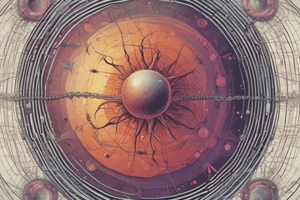Podcast
Questions and Answers
Qu'est-ce qu'un agent pathogène?
Qu'est-ce qu'un agent pathogène?
- Un micro-organisme qui provoque une maladie (correct)
- Un micro-organisme qui protège l'organisme
- Un micro-organisme qui régule le système immunitaire
- Un micro-organisme qui aide à la digestion
Qu'est-ce que la virulence d'un microorganisme?
Qu'est-ce que la virulence d'un microorganisme?
- Sa capacité à causer une maladie (correct)
- Sa capacité à se multiplier rapidement
- Sa capacité à produire des anticorps
- Sa capacité à aider l'hôte à se défendre contre les maladies
Quel est le rôle des capsules chez les bactéries pathogènes?
Quel est le rôle des capsules chez les bactéries pathogènes?
- Aider les bactéries à se reproduire rapidement
- Faciliter la digestion des bactéries
- Assurer la production d'énergie pour les bactéries
- Protéger les bactéries de la phagocytose (correct)
Quelles sont les classes d'exotoxines?
Quelles sont les classes d'exotoxines?
Quelle est la principale caractéristique des exotoxines?
Quelle est la principale caractéristique des exotoxines?
Flashcards are hidden until you start studying
Study Notes
-
Maladies infectieuses*
-
Infections et maladies
-
Agents pathogènes :
-
✽* Microorganismes capable of causing disease
-
Infection :
-
✽* Invasion of a host by a pathogenic microorganism
-
Maladie :
-
✽* Disfunction of an organism, involving various symptoms and a certain evolution over time
-
Maladie infectieuse :
-
✽* Disease caused by the transmission of a pathogenic microorganism
-
Pathogénicité et virulence
-
Pathogénicité :
-
✽* Capacity of a microorganism to cause a disease
-
Virulence :
-
✽* Degree of pathogenic potential of a microorganism
-
Facteurs de virulence
-
Aide la bactérie à :
-
✽* Invade the host
-
✽* Cause the disease
-
✽* Escape the host's immune system
-
Facteurs de virulence
-
Facteurs d'invasion :
-
✽* External elements that allow the bacterium to invade host cells
-
Capsules :
-
✽* Many bacteria are surrounded by capsules that protect them from phagocytosis
-
Facteurs d'adhésion :
-
✽* Pathogenic bacteria use their pili to colonize mucous membranes and adhere to cells
-
Exotoxines
-
Toxins produced and secreted by G+ and G bacteria
-
Action of the exotoxin does not necessarily require the presence of the bacteria in the host
-
Most exotoxins are protein-based
-
Most exotoxins are thermosensitive (ex: Enterotoxin of Staphylococcus aureus)
-
Classes d’exotoxines
-
Neurotoxines :
-
✽* Interfere with nerve transmission
-
Cytotoxines :
-
✽* Inhibit specific cellular activities, such as protein synthesis
-
Entérotoxines :
-
✽* Interfere with water absorption in the large intestine; irritate the gastro-intestinal tract.
Studying That Suits You
Use AI to generate personalized quizzes and flashcards to suit your learning preferences.




